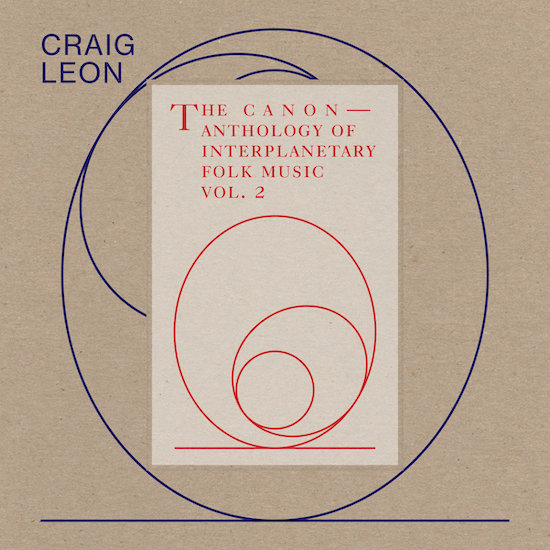The further back in time you go, you might find the future. When Superior Viaduct released a bootleg of Craig Leon’s first delve into ambient-electronica – 1981’s Nommos – it spurred him to re-release it officially, along with 1982 follow-up Visiting, as the 2014 double album Anthology of Interplanetary Folk Music Vol. 1. Now that project gets a follow up. And so a relic, excavated from the near-past, sparks action in the present.
It must be acknowledged, however, before any of the positive aspects of the work can be discussed, that Leon’s Nommos stole its conceptual palette from an ancient Malian belief concerning scientifically advanced interplanetary gods. Leon, I imagine, has become increasingly cognizant of the insensitivity of this aesthetic: the Dogon artwork has disappeared from Vol. 2’s cover and, like removing the explanatory description from a piece of conceptual art, the new record, in a sense, ceases to be about its original subject matter when taken alone. The title ostensibly becomes harmlessly tongue in cheek and not, simply, a piss take. But just because this context has been swept under the carpet, that doesn’t mean it doesn’t continue to linger in in the project’s history.
Still, as this context has been relatively eradicated from Leon’s recent work, I am inclined to take this new record on its current terms. To return to my opening point, then, it makes sense that The Canon, coming almost forty years after its predecessors, would contain both ‘The Earliest Trace’ of its stolen mythology, but close with a well needed ‘Departure’. What we are hearing is both a prequel, a sequel and a wobbly middle ground. It’s a shame, though, that it opens with a whimper, or a wail, and not with a bang, and the bang I specifically want to hear is the bang of Vol. 1’s inharmonic drums.
Leon used inharmonics – a kind of micro-tonal EQ-ing – when he was producing Suicide’s debut in the late 70s, borrowing the technique from Krautrock’s pioneers. It is what gives Nommos and Visiting their expansive otherworldliness – a noise evoking glass shattering at a quantum level. Although this satisfying tone is missing, the percussion on The Canon is consistent with its predecessors in its adherence to repetition without mutation. On ‘Standing Crosswire in the Square’ and ‘The Respondent in Dispute’, Leon probes new rhythmic territory: borrowing from Steve Reich and deconstructed club in turns. This is percussion that wants to fold the listener into itself, rewarding patience, returning it as meditation.
John Berger once remarked that music has the quality of placing the listener neither where they are nor where they are not, drawing on Zeno of Elea’s ‘motion paradox’. A cross-section of an arrow in mid-flight would reveal the travelling object as in a middle space, neither here nor there. Ambient music, surely, is the epitome of this particular inertia. It creeps in, then situates its listener in its sonic world: background music that lodges itself in the front of perception. Fittingly, the only word I can make out on ‘The Earliest Trace’ is ‘motion’ or ‘emotion’ – to move, one way or another – and as the record crawls from its beat-driven first half towards its ambient tail-end I start to sink further into its unfamiliar surroundings. Thoughts come. Stimulated, my mind wanders. I remain still.
For Leon, Anthology … Vol. 1 was the “soundtrack” to the Nommos’ ancient journey from Sirius B to Mali. While I have already explained my distaste for the particulars of this concept, what it does signal is that this music is for motionless bodies in motion—static bodies in a moving container. It is difficult not think of Brian Eno’s first ambient venture here. Eno once remarked that his intention was not to soothe those awaiting a flight but to remind them that death, should it come, need not be feared. A far flight from Spotify’s akimbo onslaught of pre-packaged ambient playlists and an integrated Headspace subscription. Leon’s record is similarly interruptive in this landscape. This is music for interplanetary airports and as much as it soothes, it sonically unsettles. But that said – when the project is taken holistically – the listener also risks being unsettled by the contexts that lie in its peripheries.


